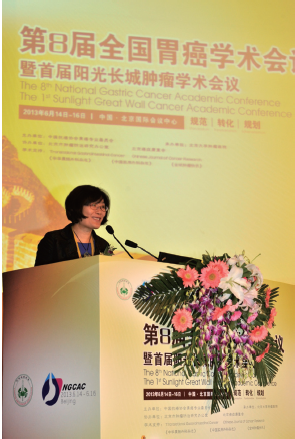The 8th National Gastric Cancer Academic Conference: focus on specification, translational research, and plan
The 8th National Gastric Cancer Academic Conference, organized by Gastric Cancer Association of Chinese Anti-cancer Association and co-hosted by Beijing Cancer Hospital, Chinese Journal of Cancer Research (CJCR), Translational Gastrointestinal Cancer (TGC), Chinese Journal of Gastrointestinal Surgery, and Chinese Journal of Practical Surgery, was held at Beijing International Convention Center from June 15 to 16, 2013. Prof. Dr. Jiafu Ji, MD, FACS, the president of Gastric Cancer Committee, Chinese Anti-Cancer Association (CACA) and Editor-in-Chief of TGC, was the chairman of the conference (Figure 1). Prof. Dr. Yan Sun, MD, academician of Chinese Academy of Engineering (CAE), was the honorary chairman of the conference (Figure 2), who was also the honorary Editor-in-Chief of CJCR. More than one thousands of professional experts and scholars from Europe, U.S., Japan, Korea and China attended the conference. Most of they are committed to gastric cancer prevention and treatment nationally and globally. The conference theme was specified as Specification, Translational Research and Plan, aiming at consensus-based specification of gastric cancer diagnosis and treatment, translation from researches to clinical practice in depth, and discussion and plan of gastric cancer prevention and treatment in China in depth and detail.
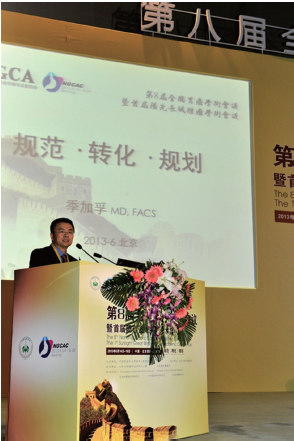
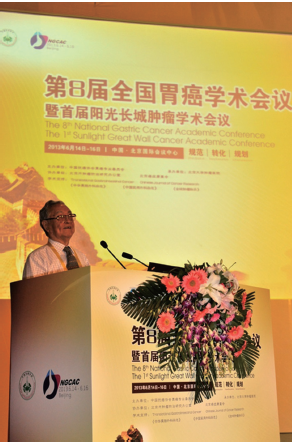
Globally and domestically renowned experts gave gorgeous plenary presentations and introduced domestic and global status and advance in the diagnosis and treatment of gastric cancer. All participants enjoyed the terrific contents from multiple breakout sessions, as well as multi-discipline and advanced communications and posters. Meanwhile, in response to the action of Sunlight Great Wall Plan sponsored by Beijing Municipal Health Bureau, the 1st Sunlight Great Wall Cancer Academic Conference was held at the same time, focusing on common malignancies with potential public health threats, public awareness and education on cancer prevention & treatment and health, with the purpose of stimulating the progress of cancer prevention and treatment in China. The conference had 11 breakout sessions. More than 80 experts and scholars gave plenary or breakout presentations. TGC journal published a special issue (Vol 2, Supplement 1, June 2013) for this conference (Figure 3). This issue included two editorials (1), 19 articles of ‘Masters of Gastrointestinal Surgery’ (2), 16 articles of ‘China Gastric Cancer Research Highlights’ (3), and 95 abstracts of research articles (4).
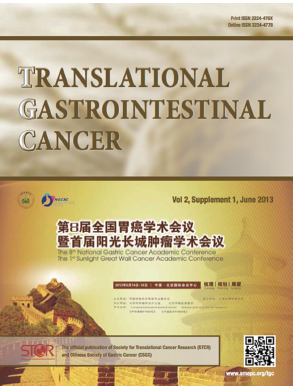
Specification: the basis and guarantee for gastric cancer surgery
In 2012, the theme of the 7th National Gastric Cancer Academic Conference was defined as Specification, Integration and Translational Research, with the focus on the intra-operative specification of gastric cancer intervention (5). The theme of this year’s conference was also relevant to the specification, which extended to the specification of gastric cancer surgery. 2013 Chinese Young Surgeons of Gastric Cancer Surgical Video Contest, organized by CJCR and TGC and sponsored by Covidien, was included in session-7 (Figure 4). Besides of intra-operative issues, other specifications of peri-operative procedures were also interpreted. These issues are closely related to the prognosis of gastric cancer surgery and are also common issues in clinical practice, including peri-operational nutritional assessment, intra-operative crisis management, the effect of anastomat selection on digestive tract reconstruction, management and prevention of abdominal adhesion, suture selection and incision suturation approaches, and avoidance of unnecessary complications. Although these issues are more than surgical techniques, they should never be ignored as important parts of gastric cancer surgery, which was also a focal point of interest over the conference.
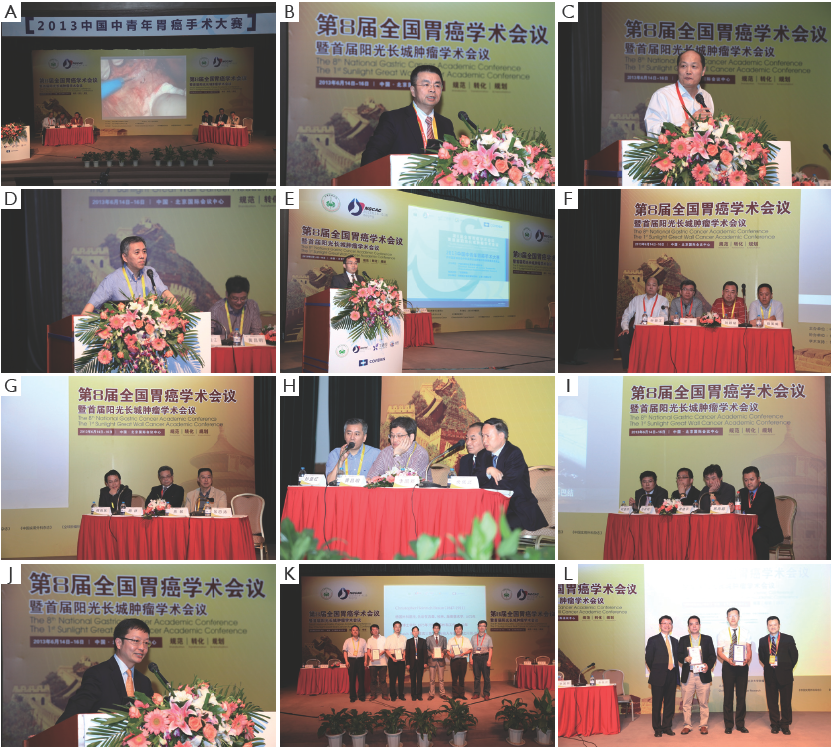
Translational research: closing the gap from bedside back to bench
The 6th breakout session of this conference was a special session for translational medicine. Several experts majored in translational medicine were from Hong Kong or the mainland. They gave wonderful talks, with topics in molecular pathology classification of gastric cancer, early diagnosis biomarkers, EB virus, chromatin remodeling gene, Asian susceptible genome, Helicobacter pylori (HP) vaccine, single cell sequencing, ‘Omics Integration Researches’ of gastric cancer. A BioBank Construction symposium was included in session-11 as a forum for discussion and communication for the development strategy, management specification and international standardization of BioBank Construction. This also provided a basis for successful translation from scientific researches to clinical practice. In order to stimulate the advances of gastric cancer researches, the internal gap between basic researches and clinical studies must be closed and the connection from bench to bedside, and from bedside back to bench should be established, contributing to successful translation from gastric cancer researches to new anti-cancer techniques and methods.
Plan: the future for the prevention and treatment of gastric cancer
Plan was also one of the theme keywords and points of interest emphasized over the conference. Over special session-3, summary of the multi-center clinical study RESOLVE in patients receiving comprehensive treatments against gastric cancer, an interim review was conducted on this current large clinical study among patients with gastric cancer in China. This study will enroll over 1,000 patients from more than 40 domestic centers. Currently, over 100 patients have been enrolled. The research data will be available after two years. The introduction of this and other similar clinical studies and the plan in comprehensive peri-operative treatments specified the goals and directions of further researches in this field.
The 2nd session was another special meeting on ‘Laparoscopic Research in Gastric Cancer and for Development Committee’. The application and progress of laparoscopy in gastric cancer has been discussed and was also a reflection of plan for the future. Motivated by domestic hospitals and centers, the use of laparoscopy is increasing in China. As demonstrated by international authorities, the efficacy of laparoscopic intervention in early gastric cancer has been confirmed, but the short- and long-term efficacy remained controversial for patients with locally advanced gastric cancer. The Chinese Laparoscopic Gastrointestinal Surgical Study (CLASS), conducting in China and aiming at evaluate the short- and long-term efficacy of laparoscopic intervention by follow-up for 3-5 years, was reported by the principal investigator (PI), Prof. Dr. Guoxin Li, MD. This study will be clinically significant for the large patient population with locally advanced gastric cancer in China.
The 5th Session, 2012 award of best research articles on gastric cancer researches in China, invited top four awarded authors to make notes to their articles. These awarded articles were selected from an online voting system through DXY.cn website, an online community for physicians, health care professionals, pharmacies and facilities in China. This event also reflected the public concerns on gastric cancers interests. It was expected that participants might get enlightened in their clinical practice by the interpretation over the meeting.
Another highlighted event of this conference was the re-introduction of Health Education Lecture to a professional conference. More than 600 citizens attended the activity of Health Lecture. Prof. Dr. Lin Shen, MD, from Department of Gastroenterology, Peking University Cancer Hospital (Figure 5) and Associate Prof. Dr. Yun-feng Yao, MD, from Department of Colorectal Cancer, Peking University Cancer Hospital, gave lectures on the prevention and treatment of gastric cancer and colorectal cancer, respectively.
Other breakout sessions, such as multidisciplinary case discussion of gastric cancer, palliative medicine and Traditional Chinese Medicine (TCM) strategies also provided a comprehensive and exclusive academic source for participants.
Most participants have been well informed of domestic and global advances and trends of gastric cancer diagnosis and progress. These will enable them to manage problems and emerging knowledge in this field from a senior perspective. This conference was a good auditory and visional source for sharing information sharing, and stimulating coordination. It was expected that all participants will make effective collaboration, work with collective wisdom and concerted effort, and make contributions to the domestic and global prevention and treatment of gastric cancer.
Acknowledgements
Disclosure: The author declares no conflict of interest.
References
- Bu Z, Ji J. A current view of gastric cancer in China. Transl Gastrointest Cancer 2013;2:1-4.
- Li G, Mou T, Hu Y, et al. Laparoscopic total gastrectomy with spleen-preserving splenic hilar (No. 10) lymph nodes dissection. Transl Gastrointest Cancer 2013;2:10-2.
- Tahara T, Arisawa T, Shibata T, et al. Aberrant DNA methylation as sensitive and promising biomarkers in diagnosing of cancers. Transl Gastrointest Cancer 2013;2:80-2.
- Zhang YJ, Guo J, Li R, et al. Evaluation of stereotactic radiotherapy in 100 elder gastric carcinoma cases. Transl Gastrointest Cancer 2013;2:AB01.
- Wu A, Ji J. The 7th National Gastric Cancer Academic Conference: focus on translational research in gastric cancer. Chin J Cancer Res 2012;24:408-14.

